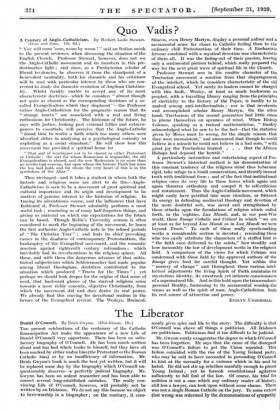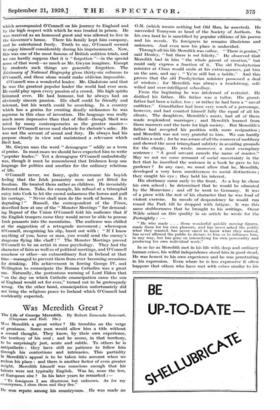The Liberator
Daniel O'Connell. By Denis Gwynn. (Hutchinson. 18s.) THE present celebrations of the centenary of the Catholic Emancipation Act make the appearance of a new Life of Daniel O'Connell very opportune. There has been no satis- factory biography of O'Connell. He has been much written about and has had whole books to himself, but they have all been marked by either undue bias (the Protestant or the Roman Catholic bias) or by an insufficiency of information. Mr. Denis Gwynn's book is much the best yet written, but it will be replaced some day by the biography which O'Connell un- questionably deserves—a perfectly judicial biography. Mr. Gwynn has been an ardent researcher and has been able to correct several long-established mistakes. The really con- vincing Life of O'Connell, however, will probably not be written by an Irishman. We do not say this because we object to hero-worship in a biographer ; on the contrary, it com•
monly gives spice and life to the story. The difficulty is that O'Connell was above all things a politician. All Irishmen are politicians. Politicians find it too difficult to be judicial.
Mr. Gwynn surely exaggerates the degree to which O'Connell has been forgotten. He says that the cause of the disregard was O'Connell's failure to get the Union repealed. This failure coincided with the rise of the Young Ireland party, who may be said to have succeeded in persuading O'Connell to hint at the necessity for a violence which in his soul he hated. He did not stir up rebellion manfully enough to please Young Ireland ; yet he forsook constitutional agitation sufficiently to fall foul of the law. Of course, his trial for sedition is not a case which any ordinary reader of history, still less a lawyer, can look upon without some shame. There was not a single Roman Catholic on the jury. To some extent that wrong- was redeemed by the demonstrations of sympathy
which accompanied O'Connell on his journey to England and by the high respect with which he was treated in prison. He was received as an honoured guest and was allowed to live in the Governor's house. There his family kept him company, and he entertained freely. Truth to say, O'Connell seemed to enjoy himself considerably during his imprisonment. Now, this was one of the most famous of British sedition trials, and we can hardly suppose that it is " forgotten "—in the special sense of that word—as much as Mr. Gwynn imagines. Except by students such things are generally forgotten. The Dictionary of National Biography gives thirty-six columns to O'Connell, and these alone would make oblivion impossible.
O'Connell was a wonderful leader. Mr. Gladstone said that he was the greatest popular leader the world bad ever seen. He could play upon every passion of a crowd. His high spirits brimmed over. He had humour, but he always had an obviously sincere passion. His chaff could be friendly and tolerant, but his wrath could be scorching. In a country which has a genius for creating deadly nicknames he was supreme in this class of invention. His language was really much more impressive than that of Sheil—though Sheil was rated by many contemporaries as the greater master— because O'Connell never used rhetoric for rhetoric's sake. He was not the servant of sound and fury. He always had his purpose clearly in view and maintained a relevance which Shell lost.
Mr. Gwynn uses the word " demagogue " oddly as a term of praise. In most cases we should have expected him to write "popular leader." Yet a demagogue O'Connell undoubtedly was, though it must be remembered that Irishmen keep one language for politics and another for the ordinary relations of life.
O'Connell never, we fancy, quite overcame his boyish feeling that the Irish peasantry were not yet fitted for freedom. He treated them rather as children. He invariably flattered them. Take, for example, his refusal at a triumphal entry into Cork to let the crowd unharness the horses and pull his carriage. " Never shall men do the work of horses. It is degrading ! " Russell, the correspondent of the Times, described how at one of the " Monster Meetings " for demand- ing Repeal of the Union O'Connell told his audience that if the English troopers came they would never be able to pursue Irish peasants into the mountains. The audience was chilled at the suggestion of a retrograde movement ; whereupon O'Connell, recognizing his slip, burst out with : " If I know anything of you, horse or man, you would send the enemy's dragoons flying like chaff ! " The Monster Meetings proved O'Connell to be an artist in mass psychology. They had the character of fairs as well as of political meetings, and O'Connell somehow or other—an extraordinary feat in Ireland at that time—managed to prevent them from ever becoming occasions for drinking. His achievement in forcing George IV. and Wellington to emancipate the Roman Catholics was a great one. Naturally, the portentous warning of Lord Eldon that " on the day on which Catholic emancipation came the sun of England would set for ever," turned out to be grotesquely wrong. On the other hand, emancipation unfortunately did not bring the religious peace to Ireland which O'Connell had confidently expected.













































 Previous page
Previous page